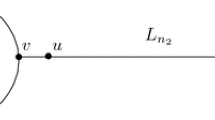Abstract
We study here the problem of determining the majority type in an arbitrary connected network, each vertex of which has initially two possible types (states). The vertices may have a few additional possible states and can interact in pairs only if they share an edge. Any (population) protocol is required to stabilize in the initial majority, i.e. its output function must interpret the local state of each vertex so that each vertex outputs the initial majority type. We first provide a protocol with 4 states per vertex that always computes the initial majority value, under any fair scheduler. Under the uniform probabilistic scheduler of pairwise interactions, we prove that our protocol stabilizes in expected polynomial time for any network and is quite fast on the clique. As we prove, this protocol is optimal, in the sense that there does not exist any population protocol that always computes majority with fewer than 4 states per vertex. However this does not rule out the existence of a protocol with 3 states per vertex that is correct with high probability (whp). To this end, we examine an elegant and very natural majority protocol with 3 states per vertex, introduced in [2] where its performance has been analyzed for the clique graph. In particular, it determines the correct initial majority type in the clique very fast and whp under the uniform probabilistic scheduler. We study the performance of this protocol in arbitrary networks. We prove that, when the two initial states are put uniformly at random on the vertices, the protocol of [2] converges to the initial majority with probability higher than the probability of converging to the initial minority. In contrast, we present an infinite family of graphs, on which the protocol of [2] can fail, i.e. it can converge to the initial minority type whp, even when the difference between the initial majority and the initial minority is n − Θ(ln n). We also present another infinite family of graphs in which the protocol of [2] takes an expected exponential time to converge. These two negative results build upon a very positive result concerning the robustness of the protocol of [2] on the clique, namely that if the initial minority is at most \(\frac{n}{7}\), the protocol fails with exponentially small probability. Surprisingly, the resistance of the clique to failure causes the failure in general graphs. Our techniques use new domination and coupling arguments for suitably defined processes whose dynamics capture the antagonism between the states involved.
Access this chapter
Tax calculation will be finalised at checkout
Purchases are for personal use only
Preview
Unable to display preview. Download preview PDF.
Similar content being viewed by others
References
Angluin, D., Aspnes, J., Diamadi, Z., Fischer, M.J., Peralta, R.: Computation in networks of passively mobile finite-state sensors. Distributed Computing 18, 235–253 (2006)
Angluin, D., Aspnes, J., Eisenstat, D.: A simple population protocol for fast robust approximate majority. Distributed Computing 21(2), 87–102 (2008)
Aspnes, J., Ruppert, E.: An introduction to population protocols. In: Garbinato, B., Miranda, H., Rodrigues, L. (eds.) Middleware for Network Eccentric and Mobile Applications, pp. 97–120. Springer (2009)
Cook, M., Soloveichik, D., Winfree, E., Bruck, J.: Programmability of chemical reaction networks. In: Condon, A., Harel, D., Kok, J.N., Salomaa, A., Winfree, E. (eds.) Algor. Bioprocesses. Nat. Comp. Series, pp. 543–584. Springer (2009)
De Marco, G., Pelc, A.: Randomized algorithms for determining the majority on graphs. Combinatorics, Probability and Computing 15(6), 823–834 (2006)
DeGroot, M.H.: Reaching a consensus. Journal of the American Statistical Association 69(345), 118–121 (1974)
Fischer, M., Jiang, H.: Self-stabilizing leader election in networks of finite-state anonymous agents. In: Shvartsman, M.M.A.A. (ed.) OPODIS 2006. LNCS, vol. 4305, pp. 395–409. Springer, Heidelberg (2006)
Holley, R.A., Liggett, T.M.: Ergodic theorems for weakly interacting infinite systems and the voter model. The Annals of Probability 3, 643–663 (1975)
Jukna, S.: Extremal Combinatorics with Applications to Computer Science. Springer (2011)
Kearns, M., Tan, J.: Biased voting and the democratic primary problem. In: Papadimitriou, C., Zhang, S. (eds.) WINE 2008. LNCS, vol. 5385, pp. 639–652. Springer, Heidelberg (2008)
Kurtz, T.G.: Approximation of Population Processes. Society for Industrial and Applied Mathematics (1987)
Lamport, L., Shostak, R., Pease, M.: The byzantine generals problem. ACM Trans. Program. Lang. Syst. 4(3), 382–401 (1982)
Liggett, T.M.: Interacting Particle Systems. Springer (2004)
Mizrachi, A.: Majority vote and monopolies in social networks. Master’s thesis, Department of Communication Systems Engineering, Faculty of Engineering, Ben-Gurion University of the Negev (2013)
Moran, P.A.P.: Random processes in genetics. Mathematical Proceedings of the Cambridge Philosophical Society 54(1), 60–71 (1958)
Mossel, E., Neeman, J., Tamuz, O.: Majority dynamics and aggregation of information in social networks. Autonomous Agents and Multi-Agent Systems 28(3), 408–429 (2014)
Preparata, F.P., Metze, G., Chien, R.T.: On the connection assignment problem of diagnosable systems. IEEE Trans. on Electr. Computers 16, 848–854 (1967)
Saks, M., Werman, M.: On computing majority by comparisons. Combinatorica 11(4), 383–387 (1991)
Author information
Authors and Affiliations
Editor information
Editors and Affiliations
Rights and permissions
Copyright information
© 2014 Springer-Verlag Berlin Heidelberg
About this paper
Cite this paper
Mertzios, G.B., Nikoletseas, S.E., Raptopoulos, C.L., Spirakis, P.G. (2014). Determining Majority in Networks with Local Interactions and Very Small Local Memory. In: Esparza, J., Fraigniaud, P., Husfeldt, T., Koutsoupias, E. (eds) Automata, Languages, and Programming. ICALP 2014. Lecture Notes in Computer Science, vol 8572. Springer, Berlin, Heidelberg. https://doi.org/10.1007/978-3-662-43948-7_72
Download citation
DOI: https://doi.org/10.1007/978-3-662-43948-7_72
Publisher Name: Springer, Berlin, Heidelberg
Print ISBN: 978-3-662-43947-0
Online ISBN: 978-3-662-43948-7
eBook Packages: Computer ScienceComputer Science (R0)




